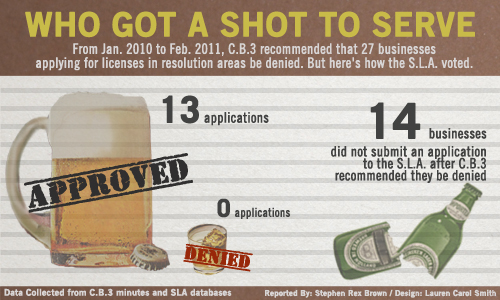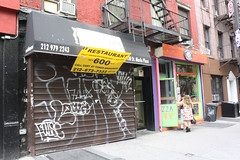 Sarah Darville The vacant space at 130 St. Marks Place.
Sarah Darville The vacant space at 130 St. Marks Place.Talk about no rest for the weary. While most Community Board 3 committees are taking the month off, the SLA and DCA Licensing committee will meet on August 20 to consider 45 different businesses seeking approval for new or modified licenses to sell alcohol.
Some of the highlights include a liquor license renewal of UCB East, which has a complaint history, according to the board. The new owners of Lakeside Lounge — soon to be Blackburn — are scheduled to appear before the committee, as expected.
A new business is bound for 130 St. Marks Place; an employee at Whole Earth Bakery next-door told The Local that rumor has it that it will be a sushi joint. (Take this with a grain of salt, Sushi Lounge is only a few doors away at Avenue A). The space had been vacant for close to a year.
And as usual, Nevada Smiths is once again scheduled to appear for approval of a full liquor license. The new location of the soccer bar has appeared on the agenda for months, only to be scratched at the last minute. Here’s the rest of what’s on tap for the Aug. 20 meeting. Read more…
 Daniel Maurer Zaragoza.
Daniel Maurer Zaragoza.Zaragoza’s nearly year-long quest for a beer and wine license is entering the final stretch.
Ruben Martinez, one of the deli’s owners, confirmed that the family-owned business will soon go before the State Liquor Authority after filing missing paperwork with Community Board 3.
“It was my fault. I had other things on my mind and I didn’t sign it off,” Mr. Martinez said of the documents that agreed to a series of community board stipulations. “It was just dropped off a week later and it wasn’t on time.”
For Zaragoza, the dry spell began last July when its alcohol license expired. The family failed to renew it and, a month later, they were charged for selling beer with an expired license. (It didn’t help that they sold the alcohol to a minor, either).
Read more…
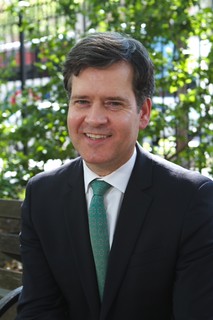 Courtesy Brad Hoylman
Courtesy Brad HoylmanSoon after Thomas K. Duane announced he wouldn’t run for re-election, the state senator all but endorsed Community Board 2 Chair Brad Hoylman, who has worked with him on many East Village issues. Over a plate of eggs over-easy, Mr. Hoylman told The Local the senator’s is “a huge legacy to live up to,” and that he considers it a “solemn responsibility to do so.” He also got specific on how he’ll carry the torch should he win in November, talking tenants’ rights, transgender equality and the new ideas that are at the top of his to-do list.
Q.
What parts of the Duane legacy do you plan to carry forward?
A.
Tom’s advocacy on tenant rights is something that I feel very strongly about. I have some background myself, in the area, not only working with Senator Duane over the years in that realm, but also as a former board member of Tenants & Neighbors, the tenants rights group. And I, as Community Board 2 chair, just launched an initiative where the board will now have a tenants clinic for the first time in cooperation with MFY Legal Services: tenants who meet income level requirements in the CB 2 area will be able to come to our tenants’ clinic and get free legal representation from MFY. So that’s the kind of tenant outreach that I want to do, and continue to do to build on Tom’s legacy.
Read more…
 Edna Ishayik
Edna IshayikCommunity Board 3 may have set a record last night: with 27 items on the agenda – including Ninth Street Espresso’s bid to serve beer, a pitch for a German beer hall on the Bowery, and a Starbucks location’s attempt to win back its sidewalk seats – the board’s State Liquor Authority committee meeting ran past 2 a.m.
The main event: the owners of B-Side are hoping to open a spot at East Broadway and Clinton Street that would be “totally different” than the punk bar on Avenue B and would include a chip shop purveying “the best fish, chips and falafel you’ve ever had,” according to owner Sivan Harlap.
In an e-mail, Ms. Harlap called the new venture a “grown-up version of B-side,” explaining that “there are things I am interested in now that I wasn’t that all interested in when I was 22 – craft beers, cocktails, thoughtful food, this new place will reflect those new interests.”
Speakers lined up to argue in favor and against the new watering hole that would be catty-corner to the Seward Park Cooperative. Some neighbors said they looked forward to having a place to grab a drink or a bite in an area that isn’t laden with bars and restaurants. But opponents, some of whom were concerned about loud noise, had collected over 600 signatures, partially through churches and schools nearby. Read more…
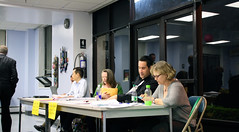 Stephen Rex Brown The State Liquor Authority committee of Community Board 3.
Stephen Rex Brown The State Liquor Authority committee of Community Board 3.Last-minute negotiations between East Fifth Street residents and the owner of the Standard East Village paved the way for the hotel’s overhaul on Monday.
The famed hotelier Andre Balazs and members of the East Fifth Street Block Association presented Community Board 3’s State Liquor Authority Committee with a series of stipulations marked up with fresh ink before formally presenting the plans for the hotel formerly known as the Cooper Square Hotel.
The sticking points of negotiations were the concepts of “undetectable” sound versus noise that is “un-disturbing to neighbors,” according to Stuart Zamsky, an officer with the East Fifth Street Block Association. In the end, the association won the former. Read more…
 Natalie Rinn Susan Stetzer points at documents as S.L.A.
Natalie Rinn Susan Stetzer points at documents as S.L.A.
committee chair Alexandra Militano leafs through them.Before finalizing a controversial set of stipulations that would ease Community Board 3’s stance against new beer-and-wine licenses in nightlife-heavy areas – so long as applicants agree to close shop early – a task force decided last night to seek counsel from a higher power: the State Liquor Authority.
During a meeting at C.B. 3’s offices last night, District Manager Susan Stetzer said that the board should repair a feeling that it is particularly unbending, shared by applicants and the S.L.A. alike. “We have become infamous,” she said, explaining that applicants’ lawyers approach the S.L.A. and say, “C.B. 3 has a moratorium [on new licenses in resolutions areas], and it’s illegal” – a sentiment with which S.L.A. chair Dennis Rosen agrees, according to Ms. Stetzer. “We are losing respect and clout,” she said. Read more…
 Michelle Rick
Michelle RickCommunity Board 3 may reverse its hardline stance against new beer-and-wine licenses in booze-heavy areas of the East Village and Lower East Side. In a letter to residents, the board will ask whether it should be more lenient to those seeking such licenses within resolution areas, so long as the businesses agree to operate primarily in the daytime and close at midnight or earlier.
The move comes just a few months after The Local unleashed a sobering study showing that the State Liquor Authority regularly disregards the board’s recommendations regarding who should or shouldn’t be allowed to serve wine and beer (as opposed to hard liquor) in resolution areas – nightlife-heavy strips such as St. Marks Place where the board has recommended a moratorium on new licenses.
At a meeting of the SLA task force last night, board member David Crane described the motivation behind the potential policy shift. “The SLA generally is going to grant a beer-wine license,” he said. “Since that’s a reality, we’re interested in preventing problems. We want to work with the SLA given that that’s a fact.” Read more…
Late last month, Community Board 3 left supporters of Heathers stunned by voting nearly unanimously to recommend a denial of the bar’s liquor license renewal. But was the whole process a waste of time? Two weeks later, the State Liquor Authority — the true arbiter of the fate of businesses that sell booze — renewed the bar’s license with little fanfare, raising doubts about whether it had heeded the board at all.
Just how much stock does the S.L.A put in the community board’s recommendations, anyway? For all the blogosphere’s feverish coverage of dramatic and often-controversial community board rulings, the question is rarely addressed. To answer it, The Local combed through a year’s worth of liquor authority license applications going up to Feb. 2011 (we ignored applications after that date, since many of them are still under review). In that year, we found that the State Liquor Authority consistently granted licenses to bars and restaurants that Community Board 3 had recommended for denial.
Read more…
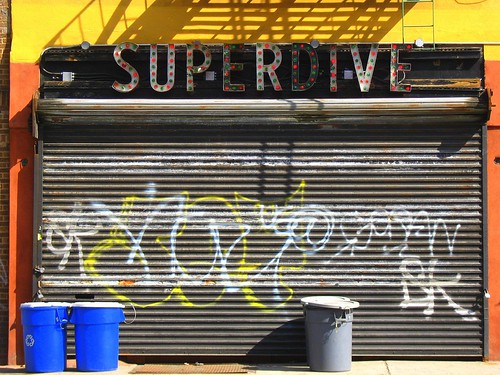 Susan Keyloun 200 Avenue A, earlier this summer.
Susan Keyloun 200 Avenue A, earlier this summer.The owners behind a proposed art gallery and restaurant at the former site of Superdive, one of the most controversial East Village bars in recent memory, will soon formally go before the State Liquor Authority, a spokesman confirmed yesterday. The last time 200 Avenue A was on the radar, Michael Taub, the owner of the building, was met with skepticism by Community Board 3 and Councilwoman Rosie Mendez after pitching the art gallery idea, which would feature a D.J., full service bar and stay open until 4 a.m. on weekends.
Read more…
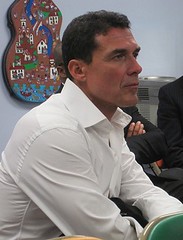 Nick DeSantis
Nick DeSantis Famed hotelier André Balazs was rewarded for his cameo at Community Board 3’s SLA Committee meeting last night, as the group voted unanimously to support his application to transfer the Cooper Square Hotel’s liquor license to his name.
Mr. Balazs’s high-profile establishments – the Mercer Hotel in Soho and the Standard in the meatpacking district – are magnets for celebrities. His Cooper Square Hotel takeover raised questions that the party atmosphere of the Boom Boom Room (his nightclub in the Standard) could soon migrate to the East Village. But Mr. Balazs ameliorated those fears by addressing residents directly. Read more…
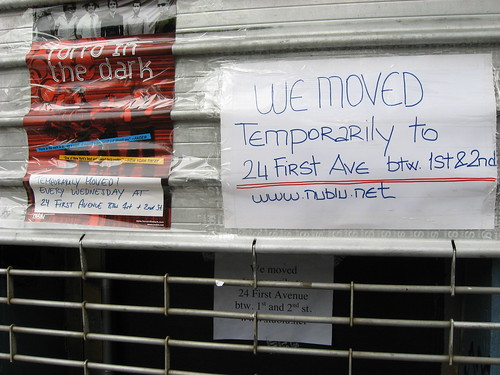 Stephen Rex Brown Signs outside of the shuttered Nublu.
Stephen Rex Brown Signs outside of the shuttered Nublu.Presenting DocuDrama, in which The Local has a look at documents that dramatize goings-on in the neighborhood. Today, a look at Nublu’s fight to reopen at its Avenue C location.
One of the East Village’s last bastions of avant garde music has been forced to leave its home on Avenue C after an anonymous tipster alerted State Liquor Authority investigators to its proximity to a Kingdom Hall belonging to the Jehovah’s Witnesses. Now, Nublu is hosting shows in the basement of Lucky Cheng’s while the owner of the business, Ilhan Ersahin, struggles to find a loophole in liquor laws so that he can return to his original location.
“Really honestly and truthfully, I had no idea that the building across the street was a house of worship until six months ago when I received this letter,” Mr. Ersahin wrote in a letter to the liquor authority in May. (You can see the full letter as well as other documents below.) “I just don’t think it’s fair to blame me for all of this and after nine years in good, willing business.” Read more…
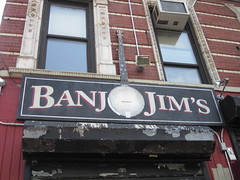 Meghan Keneally The transfer was approved for Banjo Jim’s.
Meghan Keneally The transfer was approved for Banjo Jim’s.The State Liquor Authority Committee of Community Board 3 Monday night endorsed the transfer of the liquor license at Banjo Jim’s, the popular bluegrass bar on Avenue C.
The transfer of the bar’s liquor license was said to be the only issue left to be resolved before the bar was sold to an ownership group led by Robert Ceraso. The next step is for the Community Board to pass along its recommendation to the State Liquor Authority.
The new license allows for acoustic guitar accompanied by microphone amplification and DJs up to two times per week. The hours will remain the same as they are at Banjo Jim’s currently — 5 p.m. to 4 a.m. throughout the week, and then from noon until 4 a.m. on the weekends. Few other details were finalized at Monday’s meeting, except that the signage will change — perhaps unsurprising since Mr. Ceraso has indicated that he will depart from the bluegrass theme and opt for an “artisanal” motif, which may not fit with the large banjo on the current sign over the bar’s front door. The bar’s new doors will be barn-style with glass windows that can be lifted and opened in the summer months.
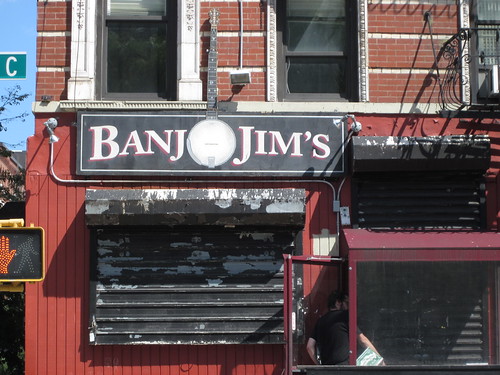 Meghan Keneally. A staple of the East Village music scene, the future of Banjo Jim’s is up for approval.
Meghan Keneally. A staple of the East Village music scene, the future of Banjo Jim’s is up for approval.After the blogger EV Grieve reported that changes may be coming to Banjo Jim’s, a popular bluegrass bar on Avenue C, locals took to their keyboards and headed to the blog’s comments section in anguish.
The bar’s prospective owner, Robert Ceraso, told the blog that he will be presenting a plan to the State Liquor Authority Committee of Community Board 3 tonight asking that the liquor license for the bar be tranferred to he and his partners. In describing his vision for his bar, Mr. Ceraso said that he envisioned it as an “artisanal neighborhood cocktail bar.” And that did him in.
Commenters skewered his use of the word, likening it to buzzwords of trends past, and immediately branded him as one of the big bad developers swooping in to discard the East Village of old.
One commenter, Chris Flash, wrote: “Yet another cool unpretentious music venue lost on the LES, to be replaced by yet ANOTHER yuppie dive, as if Ceraso’s dive will be different from any other dive!!”
Another, Bowery Boogie, said: “Missing Banjo Jim’s already. Artisinal is one of those buzz words that makes me puke every time.”
Mr. Ceraso said that the reaction was not totally unexpected.
“I knew there was going to be some backlash,” Mr. Ceraso said in a telephone interview. “People don’t like change and they turned me into some crazy guy that wants to change the neighborhood.”
Read more…
As we noted earlier, the owners of a proposed business at 200 Avenue A — the former home of the oft-criticized Superdive — are speaking before the State Liquor Authority today. City Councilwoman Rosie Mendez and members of Community Board 3 have both submitted formal letters in opposition to a liquor license for the business, which the applicant says will be an art gallery and restaurant. “The application also includes plans for a full service bar with 12 seats, live acoustic music and a DJ,” Ms. Mendez writes. “It appears that the gallery is incidental to a full service nightlife establishment.”
— Stephen Rex Brown
 Laura E. Lee Board members at a recent meeting.
Laura E. Lee Board members at a recent meeting.After a contentious two-hour discussion in front of more than 100 people, the licensing committee of Community Board 3 took no action regarding a liquor license for Piney Woods, a proposed venue at 34 Avenue A. No majority emerged during three votes on potential resolutions so the committee turned the matter over to be considered by the full board.
The venue is the work of Todd Patrick, an indie music organizer commonly known as Todd P., and Phil Hartman, Two Boots Pizza owner. Mr. Hartman also owned Mo Pitkins, a venue at the same address that closed in 2007. The space ultimately became the bar Aces & Eights in 2009.
Tensions ran high among the crowd gathered for the meeting at the Green Residence on East Fifth Street. At one point, chatter from audience members prompted Alexandra Militano, committee chair, to scold the spectators for “heckling” when opposing viewpoints were presented.
In his opening remarks, Mr. Patrick said the space would bring back some of the neighborhood’s musical and cultural history lost to gentrification.
“We are looking to be a place that harkens back to what brought us all to this neighborhood in the first place, which is the quality artistic legacy of this community,” he said.
Read more…










